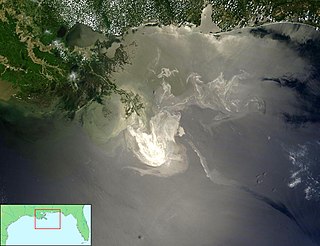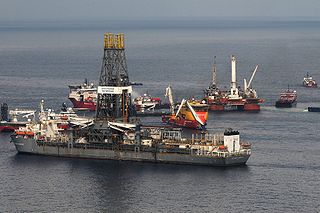Related Research Articles

An oil spill is the release of a liquid petroleum hydrocarbon into the environment, especially the marine ecosystem, due to human activity, and is a form of pollution. The term is usually given to marine oil spills, where oil is released into the ocean or coastal waters, but spills may also occur on land. Oil spills can result from the release of crude oil from tankers, offshore platforms, drilling rigs, and wells. They may also involve spills of refined petroleum products, such as gasoline and diesel fuel, as well as their by-products. Additionally, heavier fuels used by large ships, such as bunker fuel, or spills of any oily refuse or waste oil, contribute to such incidents. These spills can have severe environmental and economic consequences.

WIRES Wildlife Rescue is the largest wildlife rescue & rehabilitation charity in Australia. It is a non-profit organisation providing rescue and rehabilitation for all native Australian fauna. All animal rescuers and carers are volunteers. It is funded by public donations and operates throughout the most populous Australian state, New South Wales.

The Alaska SeaLife Center is a public aquarium and Alaska's only permanent marine mammal rehabilitation facility. It is located on the shores of Resurrection Bay in Seward. It opened in May 1998, and is dedicated to understanding and maintaining the integrity of the marine ecosystem of Alaska through research, rehabilitation, conservation, and public education. It is the only facility in the world specifically dedicated to studying the northern marine environment and the only one designed at the outset to combine research with public education and visitor components. The Alaska SeaLife Center generates and shares scientific knowledge to promote understanding and stewardship of Alaska's marine ecosystems.
MV Braer was an oil tanker which ran aground during a storm off Shetland, Scotland, in January 1993, and nearly a week later broke up during the most intense extratropical cyclone on record for the northern Atlantic Ocean, the Braer Storm of January 1993.
Tri-state may refer to:

Wildlife rehabilitation is the process of caring for injured, sick, orphaned, or displaced wild animals with the goal of releasing them back into their natural habitat. It involves medical treatment, temporary housing, and specialized care for a variety of species, from birds and mammals to reptiles and amphibians. Wildlife rehabilitation combines veterinary science, wildlife conservation, and animal welfare to ensure that animals have the best chance for recovery and survival after facing challenges such as injury, disease, or human interference.

The Southern African Foundation for the Conservation of Coastal Birds (SANCCOB) is an international non-profit organisation committed to the rescue, rehabilitation, and release of seabirds in Southern Africa. Recognised by the South African Veterinary Council, SANCCOB operates from its headquarters at the Rietvlei Wetland Reserve in Table View, South Africa.

The National Fish and Wildlife Foundation (NFWF) is an American foundation that was chartered by the United States Congress in 1984 to increase the resources available for the conservation of the nation's fish, wildlife, plants, and habitats.
Ocean Conservancy is a nonprofit environmental advocacy group based in Washington, D.C., United States. The organization seeks to promote healthy and diverse ocean ecosystems, prevent marine pollution, climate change and advocates against practices that threaten oceanic and human life.

The Cosco Busan oil spill occurred at 08:30 UTC-8 on 7 November 2007 between San Francisco and Oakland, California, in which 53,569 US gal (202,780 L) of IFO-380 heavy fuel oil, sometimes referred to as "bunker fuel", spilled into San Francisco Bay after the container ship Cosco Busan, operated by Fleet Management Limited struck Delta Tower of the San Francisco–Oakland Bay Bridge in thick fog.

The Morris J. Berman oil spill occurred on January 7, 1994, when the Morris J. Berman, a single-hull 302-foot-long barge, with the capacity to carry more than 3 million gallons of oil, collided with a coral reef near San Juan, Puerto Rico, causing the release of 750,000 gallons of heavy grade oil. The spill affected the tourism and fishing industries as well as wildlife along the shores of Puerto Rico, Isla de Culebra, and Isla de Vieques. The spill had major long-lasting impacts on the biological and natural resources of the entire Puerto Rican area. This spill was also the first to occur in U.S. waters after the passing of the Oil Pollution Act of 1990.

The Deepwater Horizon oil spill was an environmental disaster which began on 20 April 2010, off the coast of the United States in the Gulf of Mexico on the BP-operated Macondo Prospect, considered the largest marine oil spill in the history of the petroleum industry and estimated to be 8 to 31 percent larger in volume than the previous largest, the Ixtoc I oil spill, also in the Gulf of Mexico. Caused in the aftermath of a blowout and explosion on the Deepwater Horizon oil platform, the United States federal government estimated the total discharge at 4.9 MMbbl. After several failed efforts to contain the flow, the well was declared sealed on 19 September 2010. Reports in early 2012 indicated that the well site was still leaking. The Deepwater Horizon oil spill is regarded as one of the largest environmental disasters in world history.
International Bird Rescue is a nonprofit organization that rehabilitates injured aquatic birds, most notably seabirds affected by oil spills. Founded by Alice Berkner and members of the Ecology Action, including veterinarian James Michael Harris, D.V.M. in 1971 and based in Cordelia, California, the group has developed scientifically-based bird rehabilitation techniques and has led oiled wildlife rescue efforts in more than 200 oil spills worldwide, including the 1989 Exxon Valdez oil spill in Prince William Sound, Alaska, and the 2010 Deepwater Horizon oil spill in the Gulf of Mexico, where International Bird Rescue co-managed oiled bird rehabilitation efforts in four states with Tri-State Bird Rescue and Research.

The 2010 Deepwater Horizon oil spill in the Gulf of Mexico has been described as the worst environmental disaster in the United States, releasing about 4.9 million barrels of crude oil making it the largest marine oil spill in history. Both the spill and the cleanup efforts had effects on the environment.
The MV Treasure oil spill occurred on 23 June 2000, when the ship sank six miles off the coast of South Africa while transporting iron ore from China to Brazil. The ship was carrying an estimated 1,300 tons of fuel oil, some of which spilled into the ocean, threatening the African penguin populations living on nearby islands. Cleanup efforts began promptly after the incident with particular attention being paid to salvaging the penguin communities.
The Port Bonython oil spill occurred on 30 August 1992, when the fuel tank of the tanker Era was pierced by the bow of the tugboat Turmoil during berthing operations in upper Spencer Gulf, South Australia. Wind and swell were high and 296 tonnes of bunker fuel were released into Spencer Gulf. The incident resulted in 500 oiled birds and damage to 15 km of mangrove and seagrass habitat south-west of Port Pirie.

WA Wildlife, operated by Native ARC Inc, is a wildlife rescue, treatment and rehabilitation facility in the Beeliar Wetlands near Bibra Lake, Western Australia; it was the first wildlife rehabilitation facility to be licensed as a veterinary hospital by the Veterinary Practice Board of Western Australia in 2018. It has a purpose built hospital to care for the animals, with intensive care unit facilities to care for animals that would have previously been euthanised. The hospital provides treatment to more than 6500 sick and injured native animals each year. Facilities include a triage room, treatment room, consultation room, laboratory, surgery, radiology, ICU, seabird, mammal and reptile wards, isolation ward with decontamination chamber and a stand-alone necropsy suite. WA Wildlife is part of group of organisations helping to protect the nests of the snake-necked turtles that breed around Bibra Lake. In 2020 it was estimated that 25 of the hatchlings were able to make it to the safety of the lake. Native Arc Inc is a registered charity, number 21503, licensed under the Charitable Collections Act 1946.

The Wildlife Disaster Network (WDN) is an American organization focusing on aiding wild animals suffering due to natural disasters. It was created in October 2020, as a partnership between the California Department of Fish and Wildlife and the UC Davis School of Veterinary Medicine. The network is made up of rehabilitation centers, veterinarians, trained animal care volunteers, wildlife biologists and ecologists.
The Wildlife Rescue Association of BC(WRA) is a wildlife rescue and rehabilitation centre based in Burnaby, British Columbia, Canada, that is permitted to care for injured, orphaned, and pollution-damaged wildlife in British Columbia. It is a member of the Wildlife Rehabilitators' Network of British Columbia (WRNBC).

The Bird Treatment and Learning Center is a wildlife rehabilitation center based in Anchorage, Alaska. It was founded in the 1980s by a veterinarian James R. Scott, and some of its early activities were funded partially by money given to Scott by Exxon in the wake of the 1989 Exxon Valdez oil spill. The center started to move their operations to Potter Marsh in the second half of the 2010s.